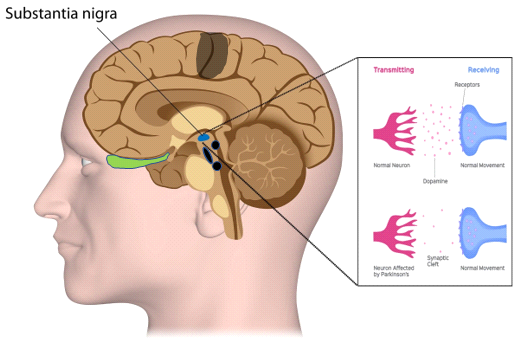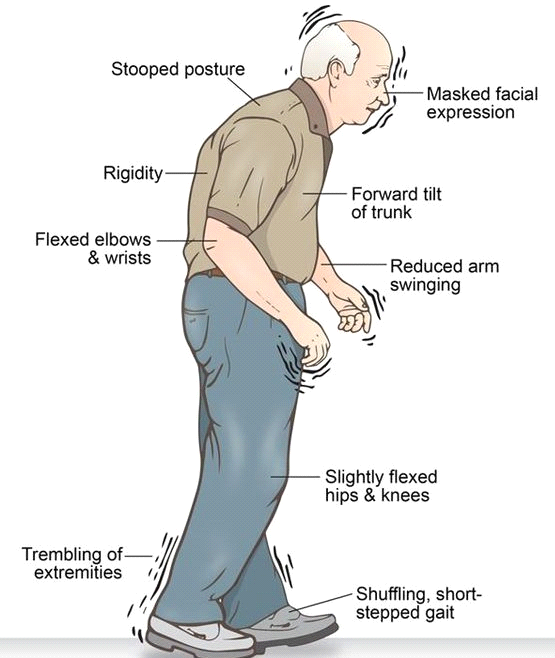Parkinson's:Cause, Symptoms and Treatment

"No one chooses Parkinson's but you can choose how to cope with it" - Michael J Fox
What is Parkinson's?
It is a progressive neurological disorder that affects the movements. Early symptoms include tremors at rest. Though tremors are most common it also causes stiffness or slowness of movement.
In the early stages of Parkinson's disease, your face may show little or no expression, decrease of arm swing during walking. Speech may become soft or slurring which may worsen as the disease progresses.
Although Parkinson's disease can't be cured, combination of medications, physiotherapy and lifestyle modifications might significantly improve symptoms and prevent secondary complications.
Causes:
Smooth and coordinated muscle movements of the body are made possible by a neuro transmitter in the brain called dopamine. Dopamine is produced in a part of the brain called the "substantia nigra."
In Parkinson’s, the cells of the substantia nigra start to die. When this happens, dopamine levels are reduced. When they have dropped to 60 to 80 percent, symptoms of Parkinson’s start to appear. Though the exact cause is not known but certain risk factors are associated with Parkinson's.

Risk factors:
- Family history:- Those having a family history of Parkinson's, are likely to develop disease too.
- Head Injury
- Age:- It commonly affects people with age 50 or above
- Toxins:- Exposure to toxins may increase the risk
Symptoms:
Parkinson's disease signs and symptoms can vary from person to person.
Parkinson's signs and symptoms may include:
- Tremor - A tremor, or shaking, usually begins in a limb, often your hand or fingers.Tremors are usually at rest.
- Slowing of movement(bradykinesia) - It may cause slowness of movement over a period, making simple tasks difficult and time-consuming. For example:- difficulty in changing positions like rolling in bed, sit to stand in a chair, walking with small steps etc.
- Stiffness - Muscle stiffness may occur in any part of your body. The stiff muscles can be painful and limit your range of motion.
- Impaired Posture and Balance - Your posture may become stooped, or you may have balance problems as a result of Parkinson's disease.
- Loss of automatic movements like loss of facial expressions, swinging arms while walking etc
- Speech and writing disorders - Speech may become slur, difficulty in writing and words may become small and illegible.
Complications:
People with Parkinson's may develop other complications
- Dementia - Deterioration in memory, thinking and behavior.
- Difficulty in swallowing or drooling
- Bladder problems - Inability to control urine
- Chest complications - With decreased chest expansion due to rigidity may develop infections
- Sleep disorders
- Constipation
- Emotional disturbances
- Fatigue - They get tired easily
- Dizziness due to drop in blood pressure during transitions like sit to stand etc.
Treatment:
Although Parkinson's disease can't be cured, combination of medications, physiotherapy and lifestyle modifications might significantly improve symptoms and prevent secondary complications.
Medications
Levadopa, dopamine agonists, anticholinergics, MAO B inhibitors
Physiotherapy:
Goal of Physiotherapy:
- Exercise therapy to improve mobility
- Maximize muscle strength and flexibility
- Correction of improper posture and balance training
- Maintain and improve levels of function and independence, which will help to improve a person’s quality of life
- Gait training
- Educate the person with Parkinson’s and their carer or family members
- Teach a good breathing pattern and effective cough techniques
Tips for supporting your loved ones:
- Stay positive - Living with a chronic condition like Parkinson’s can trigger a range of emotions, from anger to depression.
- Encourage your loved one to focus on the positives. Try to engage them in activities they used to enjoy like dancing, going for shopping etc.
- Caregiver support - Taking care of someone else’s needs can become overwhelming. Don’t neglect your own needs in the process. If you don’t take care of yourself, you could become exhausted and overwhelmed, a condition known as "Caregiver Burnout".
- Communication - Communication is key to caring for someone with Parkinson’s. Speech issues may make it hard for your loved one to explain what they need, and you may not always know the right thing to say.
- In every conversation, try to be open and sympathetic. Make sure you listen as much as you talk. Express your concern and love for the person, but also be honest about any frustrations you have.
- Day-to-day Parkinson’s care requires a lot of coordination and organization. Depending on the stage of your loved one’s disease, you may need to help to set up appointments, dispense medications at certain times of the day etc.